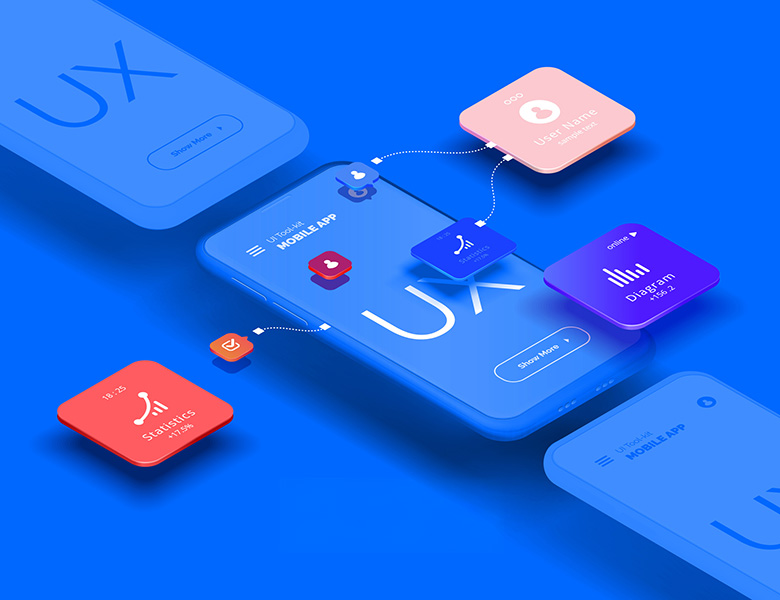Mobile apps have become a significant part of our daily lives, whether we have to communicate with people, be productive, play games, and the list can go on and on. It has also changed the way businesses operate. If you're thinking about starting your own business or just want to take a step towards being more entrepreneurial and building your own brand, developing a mobile app is the perfect solution.
In this article, you'll see what mobile app development is all about, what are the advantages you gain from developing a mobile application, and finally, what is the most successful process to follow.
What is Mobile App Development In a Nutshell?
The term "mobile app" refers broadly to software that runs on smartphones and other devices. Apps range from games and utilities to full-blown desktop applications for enterprise users.
Mobile app development is the process of developing a mobile application for smartphones or tablet devices. The process involves designing and programming the application. It also involves testing and deploying on different devices, such as smartphones, laptops, tablets, etc., before launching it in the market.
The Advantages of Developing a Mobile Application
There are many advantages of mobile app development. Creating a custom mobile app allows your company to stay relevant and on the cutting edge of new technology. Additionally, it can help you better understand your customers and build brand loyalty. In more detail, let's see what you can gain from a mobile app.
Increases Brand Awareness
Mobile apps can help you increase your brand's awareness, which is essential for any business or organization wanting to grow its sales and revenue. Brand awareness is a key metric for marketing success, and it's even more important in the digital age, where people are less likely to buy from someone they don't know or trust. Mobile app development allows you to create an engaging user experience that will increase customer loyalty through increased engagement with your brand and products/services offered by your business.
Increases Sales
A mobile app will make it easier for customers who are already interested in what you have to offer because they can simply download it directly onto their smartphones or tablets rather than having to visit your website first before buying anything from you (which might not even be possible). This means that there will be less time wasted on searching for information about products/services offered by businesses like yours - thus improving customer satisfaction levels overall!
Offers Customer Insights
Mobile apps allow you to track customer activity and understand their behavior on your platform. You will see how they move through the process, what they like, and dislike, and why they do so. This information gives you insight into how you can improve customer satisfaction in order for them to return again and again.
Improves Customer Experience
With a mobile app, you can provide new customers with more information about your products/services without having to make them go through the hassle of searching for it on the internet - which is usually quite time-consuming and frustrating for some people out there (especially those who are not really tech-savvy). Because of this, you will be able to retain more customers looking for something similar (but better) than what you offer. Furthermore, with a mobile app, you can also allow your current customers to check out their accounts from anywhere - enabling them access to all the important information they need at any given time without having to call or email anyone, which is both convenient and time-saving for everyone involved!
Strengthen Customer Relationships
Mobile apps can strengthen your customer relationships by allowing you to connect with them more personally. For example, suppose you have a loyalty program on your website and only allows customers to sign up for the program via email or phone call. In that case, mobile apps are the perfect way to increase engagement and conversion rates. In addition, most mobile applications allow users to easily share content with their friends via social media or messaging platforms like WhatsApp or Facebook Messenger.
Mobile Apps Are Cost-Effective
Mobile apps are a cost-effective way to market your business. They can be designed, developed, deployed quickly, updated regularly, and accessed by customers 24/7.
How to Launch a Mobile App to Success
The process of developing a mobile app involves many stages that can be complex, especially if you lack experience. Let's see together a strategy that's proved to work and is followed by some of the best software development companies around the globe.
Analyze
This is the most crucial step in the entire process. It's where you set the grounds for success or failure. Basically, during this initial step, you have to analyze the 5 W's of every project. Having a great idea is the starting point. Before getting into details about your app's features and functionality, you must clearly define your app's purpose and mission. Questions like
- What is your app going to do?
- What is its core appeal?
- What problems is it going to solve?
- What is your target audience?
must be answered during this step. Also, you need to find out whether other apps are similar to what you have in mind, explore design inspiration, and determine how you will market your application.
Prototype
Here is when you start getting into more details about the product design and functionality of the mobile application. This can be done with wireframes or low-fidelity prototypes, depending on what is required by your business. For example, if you want to test out an idea before investing in creating something from scratch, it's best to start with a draft version that has been designed for quick testing purposes. You will want to keep this version simple so that users can easily understand it without any major changes needed when moving onto development mode later.
Design
The next phase is where you start implementing your plans. Here, you will design one-of-a-kind user interfaces that take into account each step of user interaction to ensure that every screen contributes to achieving the objectives you established in the earlier stages. Software engineers will map the specific requirements into two main design types during this phase. The first is a logical design, describing how the major parts will fit together and the overall design hierarchy. The following type of design is physical design, which includes specific items like database schemas that lay out each individual field and table in the database in relation to one another. The customer will review these designs to ensure that everything has been considered.
Develop
Now, your project is ready to move into development. During this phase, design mockups are turned into a fully functional entity. You'll want to use all the latest programming techniques to ensure that your project is built reliably and securely. Also known as the coding phase, it is the phase most commonly associated with software development in general. Programmers will start working on in-code solutions to meet specific business requirements. At this point, the code is highly targeted to meet particular requirements created in previous steps. In addition, at this stage, you'll also want to begin working with customers to ensure that the software meets their needs. Development concludes with a thorough quality assurance testing of your project.
Launch
At this point, your app is ready to launch if everything looks good and meets your expectations. Remember that mobile app development does not end with launching. Every app will inevitably need updates and new features. You will need to incorporate user feedback into future versions of your application. A new development cycle typically begins when the app's first version is released. Remember that maintaining your product requires resources, and in addition to the money invested, a digital product like a mobile app is a long-term commitment.
Conclusion
Mobile apps are excellent tools. They allow you to increase brand awareness, customer loyalty, and sales by providing an opportunity for your customers to interact with your product in new ways. They can also help improve customer satisfaction and engagement and reduce churn rates by increasing retention time on average.
The process of mobile app development is an exciting and rewarding one. It can be used by companies of all sizes, from small businesses to large enterprises. At times, developing a high-level application can be overwhelming; therefore, having the help of experts is essential.
At Solwey, we provide design and development services that allow you to create the software you need. We work with you through all stages: from the concept and strategy to every step of implementation. With our efficient and comprehensive process, if your company needs to develop a mobile application, you'll be ready to launch your project in no time. Get started immediately by scheduling a call. We look forward to hearing from you soon.





